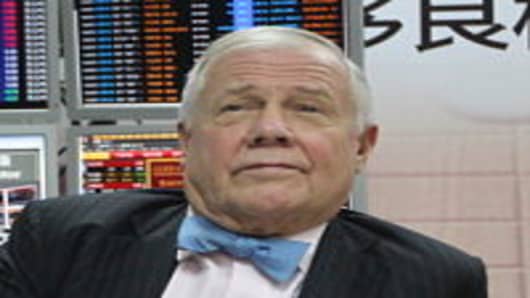China may be under pressure to cut interest rates and boost a slowing economy, but further monetary tightening would be unwise and China should keep credit tight in order to keep a lid on house prices, says billionaire investor Jim Rogers.
“I think they’re a mistake and there’s still inflation in China,” said Rogers on CNBC Asia’s “Squawk Box” on Wednesday, referring to cuts in China’s reserve requirement ratios (RRR) and interest rates earlier this year.
“Yes, the property bubble has popped and prices have started coming down but not enough in my view. The most recent statistics show that Chinese property market is starting to recover,” he said.
Since November, the People’s Bank of China has cut RRR three times, by 50 basis points each, and reduced interest rates twice to bolster economic growth. At the same time, there are signs that homebuyers, buoyed by the interest-rate cuts, have returned to the market. Prices of new homes rose in 49 cities in July, the highest number of cities reporting price increases since May last year.
Signs of a recovery in the housing market may complicate the government’s efforts to stimulate economic growth by easing monetary policy, while attempting to curb speculative investment in property.
Most economists agree that China needs to implement more easing measures and expect either another cut to the RRR, or an outright interest rate reduction this month.
Rogers, on the other hand, thinks that the government needs to keep credit curbs in place, because the declines in property prices since the start of the year are not enough to stop a bubble in the property sector that could fuel inflation (explain this).
“Well, that’s not the way you kill a real estate bubble. You don’t let it recover after six months of declines,” he said. “You stay tight. China has given in two or three times in the past few years when they have tried to pop the bubble. Things start declining, they get nervous, they loosen up again and it gets worse. I would stay tough.”
Upbeat on Growth
Rogers made headlines in 2007 after he sold his home in New York and moved to Singapore because he believed Asia was on the cusp of an economic revolution as significant as the U.S. industrial revolution of the early 20th century.
Despite the recent slowing down in China’s economy, Rogers believes that the longer-term growth of the world’s second-biggest economy is in place.
“No, I haven’t sold any of my assets in China,” he said. “My Chinese shares are for my children. Yes, there are problems in China, sure. But I assure you, if there are problems in China, the rest of us have serious problems, too.”
His views echo that of Mark Mobius, executive chairman of Templeton Emerging Markets, who told CNBC on Tuesday that China’s economy is still flying high.
“I don’t know if (China) will grow 7 percent. Why can’t they grow 2 or 3 percent?” he said. “Two percent is more than fine. The rest of the world is declining,” Rogers said.
He added: “If China grows 2 percent, everyone will be flocking to China, including me.”
China’s economy grew 7.6 percent in the second quarter, the slowest pace in more than 3 years.
—By CNBC’s Jean Chua


